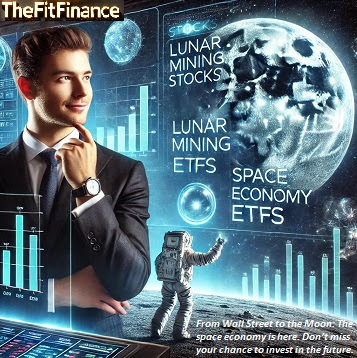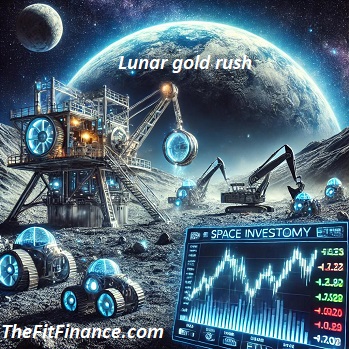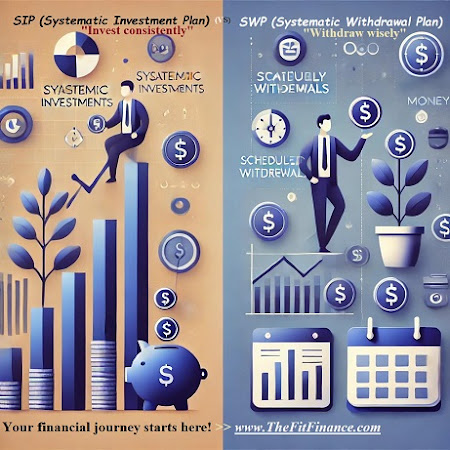The Future of Investing Is Literally Out of This World
Picture this: It is 1995, and your buddy scoffs, “Why would anyone buy internet stocks? It is just email and cat pictures.” Fast-forward 30 years, and that “cat picture machine” birthed trillion-dollar companies. Welcome to 2025’s version of that moment—except this time, it is happening 238,900 miles away on the Moon.

🌑 What Are Space Economy ETFs?
Before we dive into lunar mining, let’s cover the basics.
Exchange-Traded Funds (ETFs) are investment funds that track a specific sector, index, or industry—giving you exposure to multiple companies in a single investment.
Some of the biggest players in these ETFs include:
• SpaceX (private, but influencing the industry)
• Blue Origin (Jeff Bezos’ space venture)
• Astrobotic Technology (specializing in lunar cargo delivery)
• Intuitive Machines (focused on Moon exploration)
• Lunar Outpost (developing robotic mining technology for the Moon)
🌕 Why Lunar Mining? The Billion-Dollar Opportunity
So, why is everyone so excited about lunar mining? Simple—the Moon is packed with valuable resources.
🚀 Rare and Valuable Elements Found on the Moon
1. Helium-3 – A rare isotope that could power future nuclear fusion reactors (and potentially eliminate fossil fuels).
2. Platinum Group Metals – Essential for high-tech industries, electric vehicles, and renewable energy.
3. Titanium and Aluminum – Used in aerospace and manufacturing.
4. Water Ice – Can be converted into rocket fuel, making deep-space exploration cheaper and more sustainable.
📈 Projected Growth of Lunar Mining
• NASA and private firms like SpaceX and Blue Origin plan to establish lunar bases by the 2030s.
• The global space mining market is projected to hit $4 trillion by 2050.
• Governments are already approving space resource extraction laws, paving the way for commercial mining.
📊 Best Space Economy ETFs for 2025
Here is where things get exciting. If you want exposure to lunar mining stocks, here are some of the top Space Economy ETFs you should consider:
1️⃣ Procure Space ETF (UFO)
✅ First pure-play space ETF.
✅ Holds stocks in satellite, space tourism, and lunar exploration.
✅ Includes companies like Maxar Technologies & Virgin Galactic.
2️⃣ ARK Space Exploration & Innovation ETF (ARKX)
✅ Managed by Cathie Wood, known for investing in disruptive tech.
✅ Contains companies focused on deep-space infrastructure.
✅ Great for long-term space investors.
3️⃣ SPDR Kensho Final Frontiers ETF (ROKT)
✅ Tracks space and deep-sea exploration companies.
✅ Exposure to lunar mining tech and Mars exploration.
4️⃣ iShares U.S. Aerospace & Defense ETF (ITA)
✅ Not a pure space ETF but includes defense companies investing in space technology.
✅ Boeing, Lockheed Martin, and Northrop Grumman are major holdings.
5️⃣ Direxion Moonshot Innovators ETF (MOON)
✅ Invests in game-changing companies, including space exploration.
✅ Higher risk, but potential for massive upside.
🚀 How to Invest in Space Economy ETFs
Ready to put your money where the Moon is? Here is how you can start:
Sign up with a brokerage that offers ETFs. Top platforms include:
• Fidelity
• TD Ameritrade
• Charles Schwab
• Robinhood
• E*TRADE
Compare performance, fees, and holdings before picking an ETF. If you want pure space exposure, UFO and ARKX are strong contenders.
Space ETFs are promising but high-risk. To balance your portfolio, consider:
✅ Traditional ETFs (S&P 500, Nasdaq)
✅ Blue-chip stocks (Apple, Microsoft)
✅ Gold or Bitcoin as a hedge
You do not have to go all in at once. Use Dollar-Cost Averaging (DCA)—investing a fixed amount regularly—to lower risk and build wealth over time.
The space industry moves fast. Keep up with news from:
🚀 NASA & SpaceX mission updates
🚀 ETF performance reports
🚀 Government policies on space mining
🌟 Final Thoughts: The Next Gold Rush Is in the Stars
The moon is not just for poets anymore—it’s the next Nasdaq. Lunar mining, space tourism, and satellite technologies are set to reshape our economy in ways we can not yet imagine.
By investing in Space Economy ETFs today, you position yourself ahead of the curve—like buying Amazon stock in the 1990s or Bitcoin in 2013. The key is to start early, invest wisely, and stay informed.
⸻
📣Want to diversify further? Check out our latest post on How to Build Wealth in just 3 Simple Steps








